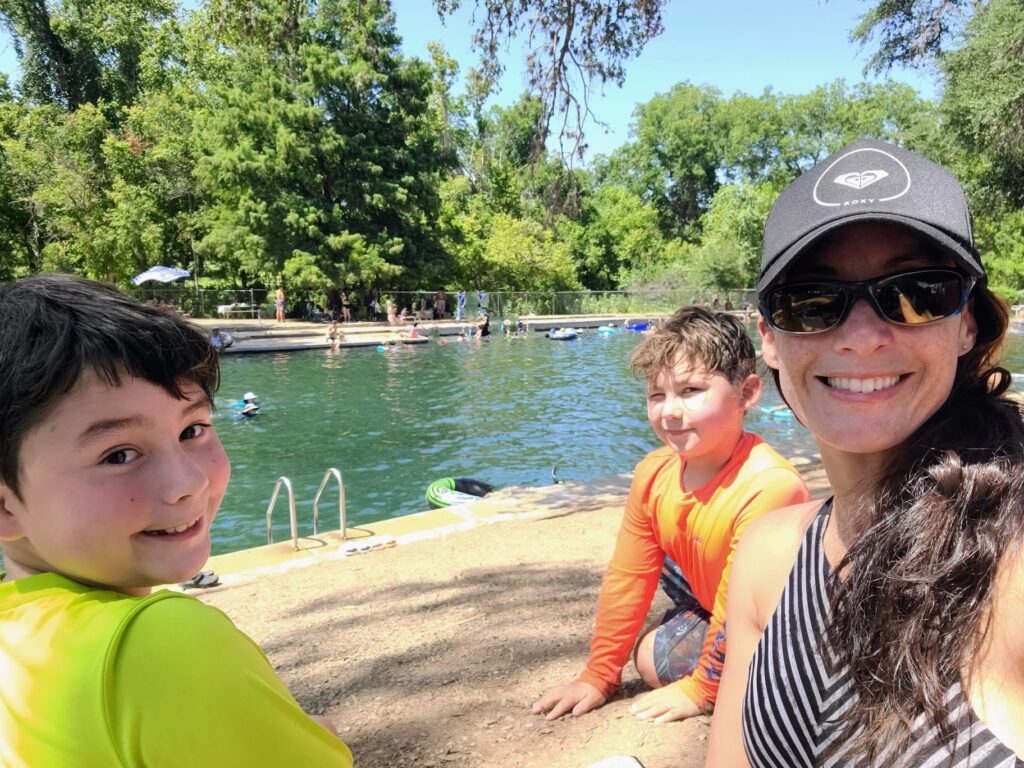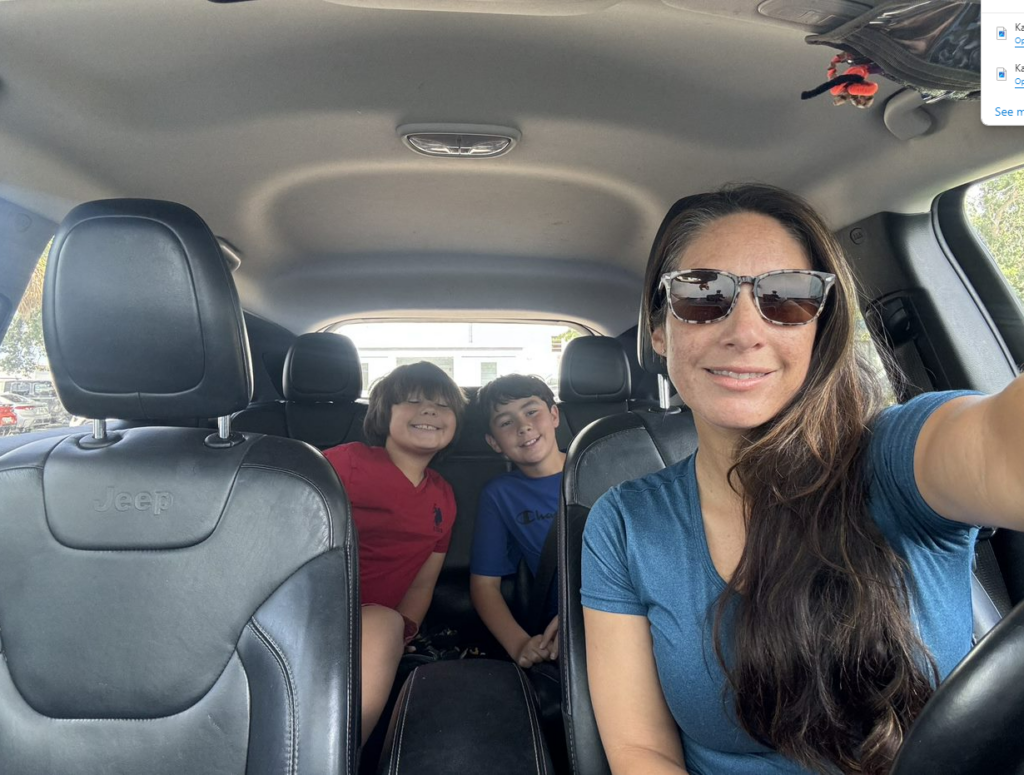
Editor’s note: This post provides a parent’s perspective to supplement our recent white paper, “A Taste of À La Carte Learning,” which spotlights the rise of unconventional learning options in Florida. Thousands of Sunshine State parents are now using state-supported education savings accounts to create unique learning programs for their children.
STUART, Fla. — Kassandra Rodriguez thought she could teach her son Zachary to become a better writer, but no. She gave him prompts she thought would spark his creativity – like, If you could make up any flavor of ice cream, what would it be? – only to get one-sentence responses.
Both of Rodriguez’s children, Zachary, 11, and Cameron, 8, have special needs that qualify them for the Family Empowerment Scholarship for Unique Abilities. That ESA, created by the state 10 years ago, gives families the flexibility to direct funding to various educational programs and providers. On average, each one is worth about $10,000 a year.
After doing some research, Rodriguez found a writing teacher on an online platform, Outschool. The teacher lives in Canada. Only three other students attended the one-hour-a-week slot (including, amazingly, another ESA kid from Florida). And Zachary loved it. Sometimes the teacher would kick things off by reading from a graphic children’s novel – say, “Wings of Fire” – then engaging students in a conversation.
“That seemed to get the juices moving,” Rodriguez said.
Soon, Zach was writing inspired, two- to three-page essays. Even better, he could take the class in the car while Rodriguez drove him and Cam to other educational activities.
Stretch that one example to more than a dozen other providers for Rodriguez’s sons, and you begin to see what’s possible with ESAs and a la carte learning.
Florida is on the cutting edge of what’s coming.
***
Last year, the Sunshine State moved to universal education choice. But even before that historic shift, thousands of parents were customizing their child’s education, using ESAs to mix and match from a growing universe of providers. Together, these parents and providers are pioneering new approaches to teaching and learning that bypass traditional schools. Homeschoolers have been doing that for decades. But now, with state support, even more families can give it a go, in numbers big enough to ripple through the entire system.
With ESAs, “You can make whatever education program you want,” Rodriguez said. “After meeting more people, and seeing what’s out there, I realized I can make things happen. I can have what I want for my boys.”
What Rodriguez wants includes two of the la carte providers featured in our new white paper, “A Taste of A La Carte Learning.” Both Surf Skate Science and Eye of a Scientist offer popular and hands-on approaches to science instruction.
But the family’s a la carte adventure hardly ends there.
Zachary is diagnosed with dyslexia, ADHD, and a speech disorder. Cameron also has a speech disorder.
Before the family moved to Florida from Iowa in 2020, Zachary had been enrolled in a private school, where he experienced bullying and fell behind academically. That experience is what led Rodriguez to try homeschooling.
Rodriguez uses her sons’ ESAs to pay for speech therapy from the same therapist they used in Iowa, only now they access the services online. Ditto for Zach’s dyslexia tutor. Both of those individuals have credentials that make them eligible for Florida ESA funding.
Rodriguez is also using the ESA to “unbundle” individual classes at nearby schools.
ESA enthusiasts have been talking up this possibility for years. In Florida, thousands of schools, including public schools, could unbundle their services if they wanted. A few examples of that are happening here and here.
Rodriguez asked several microschools if they’d let her boys take a few classes instead of enrolling full time. Some rejected the idea. But a couple said, “Yeah, we can do that.”
At one, both boys took several classes, including “simple machines” for Zach and “collaborative building” for Cam. Both involved science and engineering instruction. At the other, both boys took art and theater. The latter class met weekly for two hours for a semester, and it culminated in a community production of “Aladdin.”
There’s more. The ESA pays for Zach’s membership on a competitive traveling LEGO robotics team. And for both boys, it’ll soon pay for recreational league lacrosse and piano lessons with a music teacher.
***
Rodriguez uses the ESAs for art supplies, science kits, a book club, and BitsBox, a subscription service that teaches computer coding. She’s also purchased a variety of home education curricula and supports, including Power Homeschool, All About Reading, Singapore Math, and Story of the World.
“I overlap some curriculum because I’m afraid I’m leaving something out,” she said.

The ESAs, Rodriguez said, incentivize bargain hunting. For example, she considered enrolling her boys in a writing class at a third microschool. But the classes cost $70 an hour, while the Outschool course was $14 an hour. She and the boys also tried out another writing teacher – this one in England – but they didn’t think she was as engaging as the one in Canada.
Blazing trails on the choice frontier isn’t easy.
Zach and Cam’s schedule requires a lot of time and mileage. Their programs and providers are scattered across three counties. Some are an hour from their house.
Rodriguez is a stay-at-home mom, in part because a traffic accident a decade ago resulted in long-term injuries that keep her from working. But it’s a mixed blessing, because the situation has allowed her to devote more time to her kids’ educational needs. Also, Rodriguez’s husband is a surgeon. She knows her family can pay upfront for educational expenses and await reimbursement from the ESA in ways that some families can’t.
Still, Florida’s increasingly choice-driven education system is moving toward greater equity. Every year, more families, particularly those disadvantaged by poverty or disability, gain more power to direct education dollars the way they think is best.
***
Rodriguez has no doubt this approach works for her family.
She frequently gives her sons tests, and they often showcase their knowledge with projects and presentations. Rodriguez also recently used ESA funds for her boys to take the Iowa Test of Basic Skills, a common standardized test. She said she wants to know how they’re doing relative to students their age and whether her approach is working.
Florida law does not require students like Zach and Cam, who are using the FESUA scholarship, to take a standardized norm-referenced test in reading and math. However, such testing is required for students using the Florida Tax Credit Scholarship, the Family Empowerment Scholarship for Educational Options, and the Personalized Educational Program scholarship. The latter is a new ESA, created in 2023, for students not enrolled full-time in public or private schools and whose parents are customizing their education programming.
Rodriguez said she knows from other assessments that Zach is now reading in the 80th percentile for his age, far ahead of where he was in his prior school.
“I like that we can learn what we want – and at our own pace,” she said. “I saw Zachary struggle a lot with his dyslexia. Now he’s right where he’s supposed to be.”
Being able to access what Zach needed, when he needed it, was big. “Whatever it is, we can nip it in the bud,” Rodriguez said. “We don’t have to wait. It’s instant. We can just get a tutor and go.”
Flexibility has other benefits.
Last year, the family made multiple trips to Texas to see Rodriguez’s father before he passed away. Each time, they stayed a week or two, quickly making arrangements that might have been more difficult for a family tied to traditional schooling.
Rodriguez has told her boys they can go to a traditional school, and she’s shown them some possibilities. But so far, they have shown no interest. Truth be told, they think some of the traditional schools look like jails.
“With the amount of freedom and the amount of things we’ve gotten to do,” she said, “I don’t think we could go back.”


